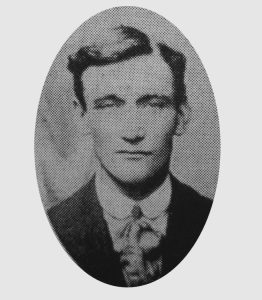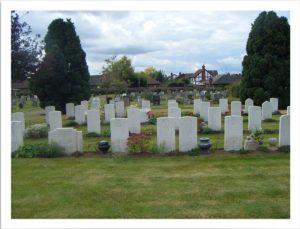1st Battalion Welsh Guards

John Gregory was the son of Charles and Mary Ann Gregory of 2 Fairhaven Street, Cheltenham. According to the 1911 Census the couple had ten children, of whom nine were still living at that time. John was born in about 1891.
He enlisted for service on 6 January 1915, stating his address to be 27 Marle Hill Road, Cheltenham and his occupation ‘Fish fryer’. He may also have worked as a greengrocer prior to joining the Army. He was posted to the Guards’ Depot at Caterham, Surrey and initially joined the
1st Battalion, Grenadier Guards. On 27 February 1915 he transferred to 1st Battalion, Welsh Guards. On 18 August the battalion landed at Le Havre and became part of 3rd Guards Brigade.
The Welsh Guards’ first action was at the Battle of Loos, when on 27 September, the third day of the battle, they took part in an attack to try to capture the German stronghold of Hill 70, just outside the town. The attack went in at about 6pm, as dusk was starting to settle. Once the advancing guardsmen reached the upper slopes they came under heavy machine gun fire and faced with strong barbed wire defences, could go no further and were forced to dig in before withdrawing on the 29th.
During this action Guardsman Gregory suffered several wounds and gas poisoning. It seems likely that Gregory was too severely injured to withdraw with his battalion and he fell into the hands of the Germans and became a prisoner of war. He spent his whole time in captivity in hospital and during this time lost three stone in weight. As the war progressed the Red Cross,
working through the neutral Swiss government, arranged for very badly wounded or sick prisoners, who would take no further part in the war, to be exchanged and repatriated.
Guardsman Gregory was exchanged in early August 1916 and was admitted to Queen Alexandra’s Military Hospital in London on the 8th of that month. He was diagnosed as having nephritis (inflammation of the kidney).
A medical board on 14 September 1916 considered that he had permanent total incapacity and he was discharged from the Army on 29 September 1916, as no longer physically fit for service (due to chronic nephritis). He was awarded a pension of 25 shillings per week, which was raised to 27 shillings and sixpence, following a medical board on 27 August 1917.
He never recovered his health and died at his parents’ home in Cheltenham on 7 November 1917, aged 26 and unmarried. He was buried in Cheltenham Cemetery, where his grave is marked by a Commonwealth War Graves Commission headstone: he is commemorated on the Cheltenham Town Memorial. His brother, George Herbert Gregory, served with the Gloucestershire Regiment during the war.

Cheltenham Cemetery, Prestbury
